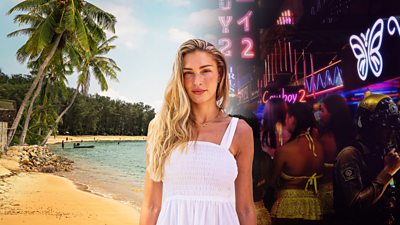
Zara McDermott travels to Thailand to discover an exotic paradise with two conflicting sides.
Beyond the golden beaches and bustling cities lie wild parties, drugs and cheap sex.
JS
Zara McDermott
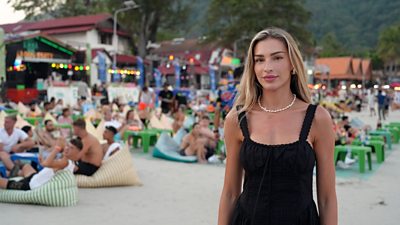
How did this latest documentary come about?
I made a documentary series about Ibiza. I really enjoyed making it and seeing how destinations operate and evolve, when tourism - particularly British tourism - has become a core function. In some places, the influx of young British tourists can created ecosystems of corruption, confusion and punishment that are eye-opening to witness.
Thailand is a hugely popular destination, and a growing one. It’s somewhere I’ve always wanted to visit, and I’d seen a lot online and in the press about different laws, rules and overall systemic issues that exist over there. I wanted to look at this side of tourism, as well as the sex tourism industry that Thailand is so famous for. I pitched the idea to the ��ѿ��ý for Thailand to be the next in our series of destinations after doing a lot of research myself and seeing the growing popularity.
How did your previous documentary experiences prepare you for exploring Thailand?
When you’re filming abroad you have to be prepared for different rules and different governance. However, Thailand is a very different place all together. I have spent a lot of time interviewing new people, having made documentaries for the last six years; I’m used to asking lots of questions and getting to know people.
My work in the violence against women space allowed me to have some difficult and emotional conversations with sex workers. My aim is for these women to feel completely seen and heard, because I truly believe that sharing our stories helps give us women power. I have a huge amount of empathy for the women who are pressured to work in such an unpredictable and at times unsafe industry.
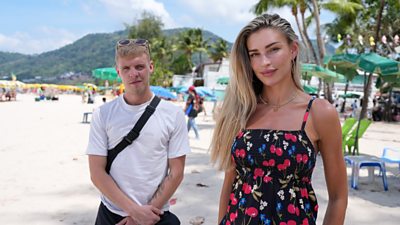
The series provides an insight into the experience of young British travellers in Thailand — can you tell us about some of the people you met?
Yes, Loukas was a very interesting character in the series for me as I felt like he went on a real journey of growth through the series. I feel he represents a lot of young British men travelling to Thailand. I met Loukas initially as a solo traveller in Pattaya and it was an opportunity to open up discussions around the ethics of sex work.
I also met Mac in Pattaya. He makes content online about visiting Thailand and his content is mostly aimed at visitors of Pattaya. He has a young girlfriend who goes by the name of Beverly Hills. They make YouTube content together which funds their life. Mac and I are quite opposing in our views, especially regarding the sex industry which made for some tricky conversations.
I also spent time looking into the Regan Kelly case, who was found dead off Patong Beach in January of this year. I spoke with his sister and felt really emotional during, and for a long time after filming. It broke my heart to see a family with no real answers. That raw emotion has really stuck with me, and I hope the family get the answers they so desperately need one day.
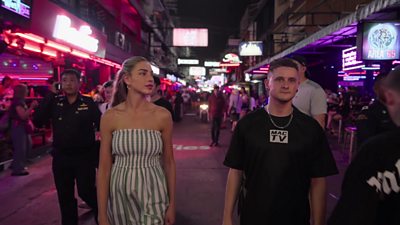
Was there anything you found particularly surprising or unexpected about why young people – particularly Brits - are drawn to Thailand?
I had done a lot of research beforehand, but nothing could prepare me for what I was about to see, especially when it came to the sex industry. I was shocked at some of the cheap, fake alcohol that was on sale, especially at the full moon party. Cannabis was incredibly easily accessible when I was there earlier this year.
Why do you think Thailand holds such a strong appeal for young travellers today?
I can see why people go to Thailand and never want to go back to the UK: the prices, the freedom, the people, the lifestyle and the beauty of the place. It really does have it all. But that can come with other costs.
How did stepping into the world of backpacking shape your understanding of why so many young people choose this style of travel?
I really loved the sense of community that comes with backpacking, people make friends for life. They get to socialise with people they’d never cross paths with otherwise, and everyone is in the same boat. I wish I’d done it when I was younger; it would have built my confidence so much and helped me make lots of new friends. I think there’s also a sense of freedom from people who travel on their gap year; they’re away from home for the first time and there are no parents around to tell you what to do!
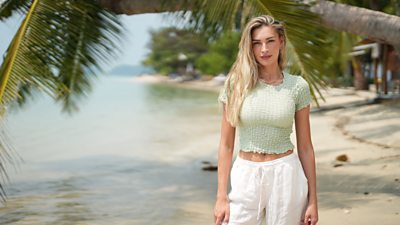
Has filming this documentary unearthed a desire to do any backpacking yourself?
I think I’m slightly past that now, although I wish I’d have done it when I was younger. I’m getting a bit too old and I’m in a different place in my life now. But if I could go back in time I’d definitely go!
What’s your idea of a perfect holiday?
A perfect holiday to me is not actually about the destination, it’s about the people I’m with. I love going away with my family and spending quality time with the people I love.
Has making this documentary made you approach travelling/going on holiday in a new way?
I’m a proper rule follower by nature, so I have always been super cautious anywhere I’ve been. Meeting Shakira was a huge wake-up call though: that someone could mistakenly and inadvertently get caught up in huge trouble. I still find it utterly confusing that some pharmacies in Thailand sell prescription medication over the counter, which Shakira was subsequently arrested for possessing.
How did you balance showing the fun/party side of Thailand with some of the challenges/dark side visitors may face?
There’s fun everywhere you turn in Thailand! So it wasn’t difficult to capture that, finding the fun wasn’t a challenge at all. However, it often comes at a huge cost. I’m always intrigued by the trade-offs, and I want to tell the stories of people who might be losing out from the ‘fun’ side.
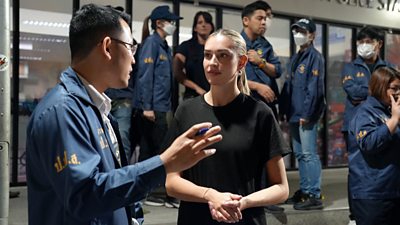
How important was it for you to meet Brits who have moved to Thailand more permanently, rather than just the typical tourist experience?
It’s always important to see that side too. Holidaying in a destination and living there are two very different things. People will often say “I wish I lived here!” when they go on holiday somewhere beautiful, however it was important to show the realities of that, and actually just how difficult that can be. Not only financially, but also politically and socially.
What do you hope viewers, especially younger audiences, take away from this series?
I think this series is fun and entertaining, but I hope it questions what consequence looks like when you are thousands of miles from home. I hope that audiences will see that actions do have consequence, and you can’t just leave your inhibitions on the plane. Sometimes these consequences can be unpredictable.
How does this documentary differ from your previous work on more UK-focused social issues? And/or, what are the similarities?
This series contains a bit more fun, and has some more of my personality injected into it, but at its core it asks important questions about the ethics of the sex industry, we meet some of the women working in it, it looks at justice (and injustice), it looks at social and moral principles.
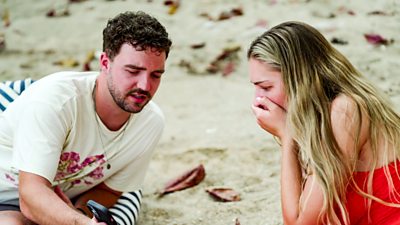
As someone in the social space, what role do you think social media and influencers play in the allure of Thailand for young travellers?
Social media gives an illusion of Thailand which, at times is real, true and representative of the real thing: it’s beautiful, the people and parties are amazing, the beaches are idyllic and the weather is incredible. But scratch beneath the surface and there can be complications that tourists may not know about.
What’s next for you after this documentary?
I am currently researching for another destination documentary, and I’d love to do more projects that cover violence against women and women’s issues.
Follow for more
Latest from the Media Centre
All newsSearch by Tag:
- Tagged with Factual Factual
- Tagged with Media Pack Media Pack
- Tagged with Latest News Latest News
- Tagged with ��ѿ��ý Three ��ѿ��ý Three